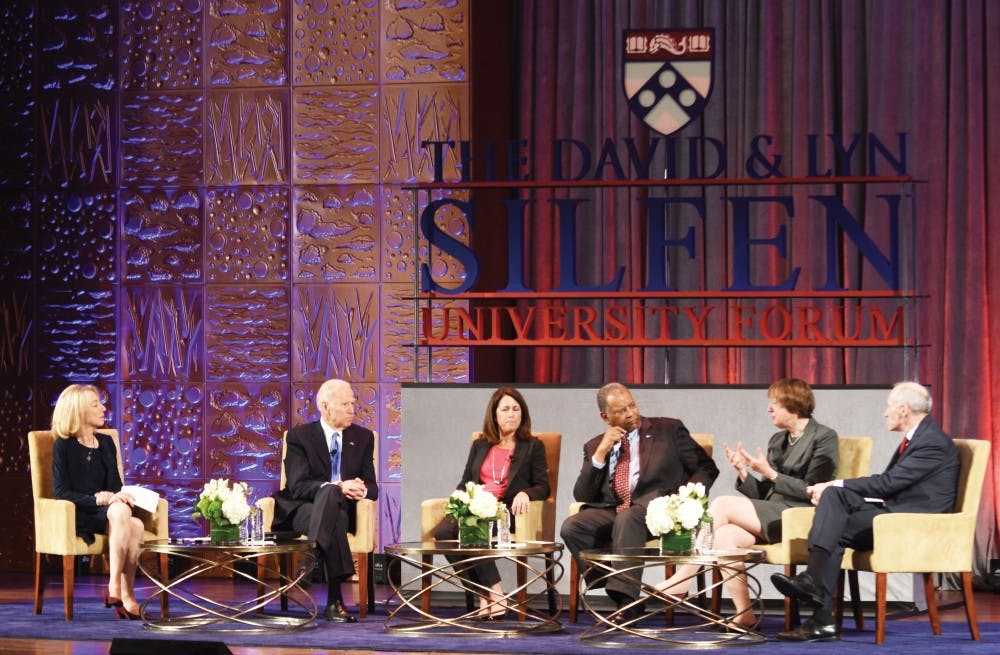Former Vice President Joe Biden came to campus for the first time since the announcement of his new role as a Penn professor on Tuesday afternoon.
As part of the David and Lyn Silfen University Forum, Biden participated in a panel discussing the fight to cure cancer, which Penn President Amy Gutmann called a “formidable foe.”
After briefly poking fun at Biden’s appearances on the TV show “Parks and Recreation” and his ubiquity in the satirical news outlet The Onion, Gutmann opened by honoring Biden’s accomplishments.
“He is the only Penn faculty member in the world to be awarded the Presidential Medal of Freedom with distinction,” Gutmann noted, to applause from the audience.
Referring to Gutmann as “Madam President,” Biden joked, “I’m glad I’m still accustomed to being able to address a president.”
Biden and Gutmann were joined by Chief Medical Officer of the American Cancer Society Otis Brawley, Director of Clinical Research for the Fred Hutchinson Cancer Research Center Nancy Davidson, Perelman School of Medicine Professor Carl June and Penn Medicine patient and pancreatic cancer survivor Kim Vernick.
Amid discussion about immunotherapy and targeted strategies, Biden argued that the United States has an unparalleled capacity for innovation.
“We have more high-quality research universities than the rest of the world combined,” the former vice president said. “We have the greatest capacity to make progress as any time in the history of the world.”
Noting that every head of state would gladly switch places with the President of the United States, Biden commended the American cultural traits that make breakthroughs possible.
“Our country has no respect for orthodoxy — and that’s a good thing. To make new things you have to break the old mold,” Biden said. “We need to get back to: ‘There’s not a damn thing we can’t do if we set our minds to it.’”
Otis agreed, noting that universities are incubators for scientific discovery.
But panelists stressed that discovery and care go hand in hand.
“Between nutritionists, social workers making sure that I’m comfortable and the Nursing Staff — it takes a community,” Vernick said.
And for Vernick, that community was Penn.
“I’m a native Philadelphian,” Vernick said, while describing her battle with pancreatic cancer. “[For cancer treatment], it’s not ‘why Penn?’ It’s ‘of course Penn!’”
However, the panelists were not shy to identify possible areas of improvement in the medical industry. Biden, whose son Beau died of brain cancer in 2015, criticized the research community for not consistently sharing the results of their studies, which he saw as a roadblock to collaborative progress.
“No other occupation in the world would be able to get away with that,” Biden said passionately. “It’s time to stop. It’s time to share.”
“I’m not upset about it at all,” Biden then said sarcastically, as his passionate speech told the opposite.
Biden explained the importance of the Affordable Care Act and the increased societal costs that are incurred when citizens don’t have proper access to healthcare. However, he also noted that cancer research “is the only bipartisan thing left right now,” citing his recent effort to get a research-funding bill through U.S. Congress.
The event was in keeping with Biden’s “cancer moonshot” effort — to which he devoted substantial effort during his final months as Vice President. However, Biden’s role on the Penn faculty will not be related to cancer research advocacy, as he will instead focus on foreign policy at the Penn Biden Center for Diplomacy and Global Engagement in Washington, D.C.
For some Penn students, the political aspect of the event was the most exciting.
“I care about curing cancer, but it’s mainly Joe Biden. I’m a [political science] major, and I’m obsessed with him, so naturally I [had] to see him,” College freshman Isabella Fierro said.
Similarly, College sophomore Rebecca Ly was excited to witness the interplay between politics and cancer research during the discussion.
“I’ve done cancer research, and it’s a very breaking thing,” Ly said. “Cancer has affected [Biden’s] life directly. But he also brings a political standpoint to this.”
And as for Biden, he remains optimistic.
“We can change the face of cancer in the next five years,” he said.









